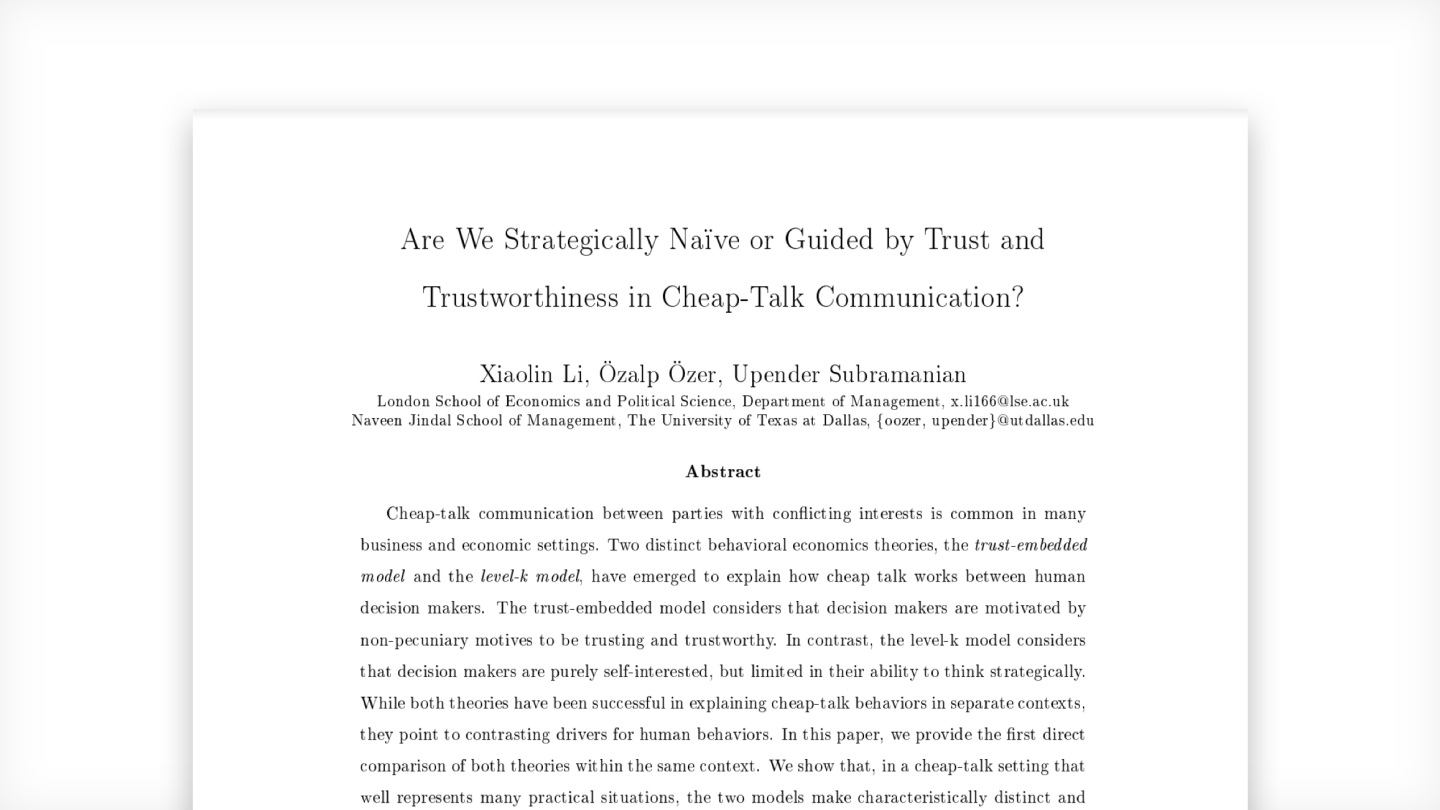Trust and trustworthiness are important in both our personal and business relationships. How then can we build environments that foster increased trust, trustworthiness and cooperation?
In the first edition of a new series that focuses on research papers published by scientists within the Amazon Supply Chain Optimization Technologies (SCOT) organization, we interview Özalp Özer, coauthor of “Are We Strategically Naive or Guided by Trust and Trustworthiness in Cheap-Talk Communication?”. The paper was published in Management Science — the flagship journal of the Institute for Operations Research and the Management Sciences (INFORMS) in April 2021.

Özer is a senior principal scientist at Amazon, and George and Fonsa Brody Professor of Management Science at The University of Texas at Dallas (UTD). He earned a PhD in operations research from Columbia University, before going on to serve on the faculty at Stanford and Columbia. Özer has published extensively on a diverse range of topics, from supply chain management, capacity and inventory management to pricing and revenue management.
Özer says that a guiding principle behind his research is to focus on solving problems that have a real-world impact at scale. At Stanford and then UTD, Özer found himself drawn to the field of behavioral and experimental economics — particularly the field of game theory and understanding how to model actions and emotions in scenarios involving multiple decision makers in dynamic environments.
Driven by his interest in tackling real-world business problems, Özer remained engaged with industry during his tenure as an academic. While working on a project focused on designing effective procurement contracts, he observed the important role that trust played in establishing and fostering business relationships.
In many cases, the interests of the parties engaging in a negotiation are not aligned. To give one example, suppliers can use product forecast information from a buyer to make capacity, inventory and other manufacturing-related decisions. However, buyers might often provide suppliers with overly optimistic forecasts to ensure an abundant supply. If the demand for the product turns out to be lower than anticipated, the supplier bears the excess investment risk.
Özer says that this scenario represents an example of “cheap talk communications.” He outlines three characteristics that are common to all cheap talk communications: they are costless (they are devoid of monetary penalties), they are non-binding (a buyer can provide a forecast without committing to it), and they are non-verifiable (no forecast can be completely accurate in the light of market uncertainty). To complicate matters, the objective functions that each party is trying to maximize are at odds (or not perfectly aligned) with each other.
Standard game theory suggests that each party in a business transaction will move toward an equilibrium that maximizes their own payoff. In a cheap-talk setting, where the information is costless, non-binding and non-verifiable, the theory suggests that each party will disregard the information supplied by the other.
However, Özer finds that people involved in business (as well as personal) transactions frequently factor into their decision-making information supplied by the other party, even when their incentives are not perfectly aligned and even when the information or recommendation may be perceived as “cheap”. They do this by taking the business context and the related relationship into account. Doing so results in higher returns for both parties involved. For example, third-party sellers are more likely to act on price reduction or replenishment recommendations from Amazon, if they find that these recommendations have previously resulted in an uptick in sales and profits.
Ozer says that “cheap talk” communications have the unfortunate emphasis on being “cheap” and less emphasis on how they are informative and can align incentives. In a series of publications, Ozer shows why, when, and how such communications and recommendations turn out to be informative, and how they help align business objectives, resulting in both parties making better decisions.
In this interview, Özer talks about findings from the recently published INFORMS paper and discusses the implications of these findings for companies like Amazon.
Q. What are the two models that can be used to explain how cheap talk communications work between decision makers?
As our paper suggests, there are two contrasting economic theories that can be used to analyze cheap-talk communications.
The trust-embedded model — which takes a more optimistic view of humanity — suggests that decision makers are motivated by non-monetary motives to be trusting and trustworthy, besides the monetary incentives such as maximizing cash flow.
Here, we define trust as instances of decision makers behaving voluntarily in a way that put themselves in vulnerable engagement due to the uncertain behavior of the other party (the trustee), based upon the expectation of a positive outcome from that engagement. Trustworthiness flips the perspective to that of the trustee. We define trustworthiness as an instance of a decision maker behaving voluntarily in a way not to take advantage of the trustor’s vulnerable position – even when faced with a self-serving decision that conflicts with the trustor’s objectives.
Humans use non-Bayesian, trust-based belief systems to update their rules governing interactions with other parties. In short, people involved in a business transaction are willing to be vulnerable and take risk.
The trust-embedded model suggests that when engaging with others, decision makers are averse to manipulating information in economic interactions. They incur disutility from lying. As a result, they assess the trustworthiness of the counterparty, and they form a trust factor towards them. This trust factor governs how decision makers interpret and use the information they receive from others.
In other words, humans use non-Bayesian, trust-based belief systems to update their rules governing interactions with other parties. In short, people involved in a business transaction are willing to be vulnerable and take risk. Because they assess — even sometimes incorrectly — that doing so yields positive outcomes, they engage in and cultivate behaviors conducive to enabling these outcomes.
The trust embedded model suggests that individuals are guided by more than self-interest or pecuniary motives as they engage in transactions. For example, senders of information are guided by factors such as fairness and tenets that are central to their company. As a result, they share more information and resources than strictly necessary.
In contrast to the trust-embedded model, the level-k model — the second model discussed in the paper — suggests that decision makers are limited in their ability to think strategically. Receivers of information cannot anticipate the extent to which the sender might have distorted the message. On the flip-side, senders cannot account for just how much receivers might discount their message. Consequently, senders share more than necessary, because they take a dim view of the receiver’s ability to discount their message.
It’s important to note that even the level-k model can sometimes explain why senders and receivers tend to overshare information in a cheap-talk setting, which contrasts with the outcome standard game theory models would predict. It’s just that their motivations are different – with the level-k model, oversharing is driven by a limited ability to think strategically, rather than by the willingness to be trusting and trustworthy.
Overall, our paper that analyzed existing cheap-talk experiment data, found more support for the trust-embedded model, suggesting that individuals are also driven by non-monetary incentives when conducting transactions.
Q. Why do you think that trust-embedded models do a better job of explaining cheap-talk communications? What are the implications for organizations engaging in relationships with businesses and partners?
During the internet age, we’ve seen e-commerce, hospitality and ride-sharing companies grow precisely because they’ve been able to create policies and tools that encourage trust.
The answer to your first question is relatively simple — human beings are far more sophisticated than the level-k model gives them credit for. For example, there are many sellers on Amazon’s website who are proficient in using a variety of tools they have developed to make decisions related to pricing and inventory.
As a result, if we want the tools we provide to earn sellers’ trust, we need to think of the system more holistically at both an architecture and policy level to truly understand what builds trust and what is a trust-buster.
During the internet age, we’ve seen e-commerce, hospitality and ride-sharing companies grow precisely because they’ve been able to create policies and tools that encourage trust. Product reviews, the ability to get refunds for a vacation rental because hosts might not have lived up to their promises, or the price for a ride being set in advance — these are some of the mechanisms that let you buy a product or rent a home from people you don’t know.
Q. How are the findings in your paper applicable to your work at Amazon?
We are leveraging the insights from this stream of research as well as others to augment our understanding of seller trust, particularly in relation to how sellers interact with our inventory management tools, and how fidelity of recommendations impact sellers’ trust.
There is no interaction at Amazon that I can think of that doesn’t have an element of trust.
We are designing our related processes to reduce barriers for trusting and trustworthy engagements among the participants of our stores; for example, by making specific investments to support seller growth in areas that benefit sellers and customers the most; by reducing perceived vulnerabilities in carrying excess inventory; by looking into ways in which we stabilize our policies; by creating visibility to the reasons for our recommendations; by looking into ways in which we can build interactive communication channels among participants in our stores; and by building reputation and feedback systems that foster trusting and trustworthy engagements and on and on.
Using large-scale data, scientific methods like causal machine learning to optimization, as well as continual engagement with selling partners and customers, we aim to identify at the extent to which sellers trust evolves — so we can identify and invest in processes that foster trust and as a result growth and economic prosperity.
There is no interaction at Amazon that I can think of that doesn’t have an element of trust. Jeff Bezos has said, “You can’t ask for trust, you just have to do it the hard way, one step at a time.” In my time at the company, I have been struck by the tireless efforts of so many people to gain seller and customer trust. At Amazon, it is just part of everything we do.


















